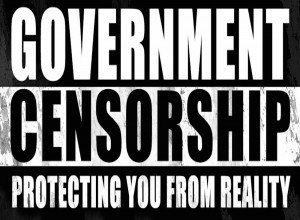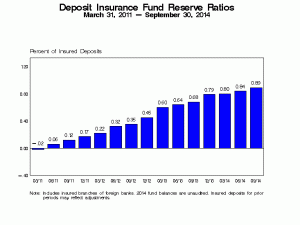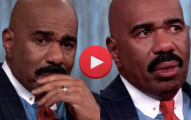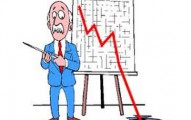We have already had examples of bank bail-ins. We have had not just the United States, but all members of the G20 enact a resolution mandating legislation to allow for bank bail-ins, and the confiscation of customer deposits. We have had the United States under Dodd-Frank declare your deposits as unsecured creditors, and at the lowest end of the scale for reimbursement in the advent of a bank collapse.
We have had financial institutions such as J.P. Morgan and Bank of America con Congress into allowing their derivative assets to be placed under the FDIC as a primary creditor, and according to the agencies own 2014 annual report, the deposit insurance corporation has even less reserves to support account holders in the advent of a bank failure today.
So why do we still trust banks with all this evidence showing that during the next banking or financial crisis, Americans will lose most or all their money?
In its 2014 annual report the FDIC itself points out that its whole insurance fund constitutes just a fraction of a percent of all deposits in the system, and that its ‘reserve ratio’ is just 1.01%.
With a reserve so low, the FDIC not only lacks any meaningful teeth to insure the system, but it actually fails to meet the minimum level that is required by law.
This quasi-government regulatory agency fails to meet the government regulatory requirement and is in worse shape than the banks that it’s supposed to insure.
Perhaps even more important, the FDIC doesn’t expect to meet this statutory minimum until at least 2020.
To me this begs an obvious question. Do we really have another 5+ years before there’s another major crisis in the US banking system?
Most US banks today are just as illiquid as they were before the crisis, holding just a tiny portion of deposits in reserve and gambling away the rest.
And the most popular place that they invest their customers’ deposits today is exactly the same as in 2008: mortgage-backed securities.
Curiously, the FDIC’s reserves today are actually far lower than they were prior to the crisis.
On top of that, back then the FDIC only insured $100,000 worth of your deposits per financial institution. Now it’s $250,000.
So essentially the FDIC is on the hook to pay more than twice as much money to depositors. Yet it has a lower reserve to support an even larger system that is up to the same precarious practices as before. - Sovereign Man
Dozens of economists are placing their reputations on the next economic or financial collapse occurring sometime between September and October of this year, and many believe that the Jade Helm 15 exercise is actually a staging operation in case it does occur within that time frame. And not only has history shown that the government can and will enact Bank Holidays and confiscation of hard assets in times of a financial emergency (1933), but an Emergency Order created in the 1950’s has been confirmed by each President since FDR allowing for the President to seize everything should he choose to invoke this ultimate power.
There is an old axiom that says, if you don’t hold it, you don’t own it. And trusting and relying upon the government or the banks to sustain you when a crisis of their making takes place is the surest way to discover that when you wake up one morning, all that you had worked for and saved for is gone. And it is beyond the time to look seriously at whether you should keep any money beyond the necessities of paying your bills in a bank, and for you to find alternative means of protecting your wealth. For the one thing you will not be able to rely upon are the promises of the FDIC, as their own information shows they have less than $25 billion to cover deposits of over $9 trillion (not including $75 trillion in derivatives), and it will be your money that bails out the banks when the time comes.
Kenneth Schortgen Jr is a writer for Secretsofthefed.com, Examiner.com, Roguemoney.net, and To the Death Media, and hosts the popular web blog, The Daily Economist. Ken can also be heard Wednesday afternoons giving an weekly economic report on the Angel Clark radio show.




